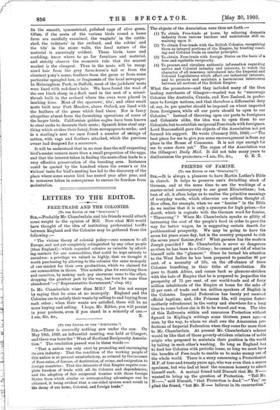[TO THE EDITOR OF THE " SPECTATOR."1 SIR, —There is assuredly
nothing new under the sun. On May 18th, 1849, an influential meeting was held at Glasgow, and there was born the " West of Scotland Reciprocity Associa- tion." The resolution passed was in these words :— " That a nation can only exist by promoting and encouraging its own industry : That the condition of the working people of this nation is at present unsatisfactory, as evinced by the increase z>f Poor-rates, of disease, of destitution, of crime, and emigration to foreign countries : That the interests of this Empire require com- plete freedom of trade with all its Colonies and dependencies, and the adoption of fair reciprocal treaties with those foreign States from which similar or corresponding advantages can be obtained, it being evident that a one-sided system must result in the decay of our home, Colonial, and foreign trade." The objects of the Association were thus set forth :—
(1) To obtain Free-trade at home, by relieving domestic industry from various burdens and restrictions still re- maining upon it.
(2) To obtain Free-trade with the British Colonies, recognising them as integral portions of the Empire, by treating coast- ing and Colonial trade on similar principles.
(3) To obtain Free-trade with foreign States on the basis of a true and equitable reciprocity.
(4) To procure and circulate authentic information regarding native and Colonial industry and interests, to watch the character of all measures introduced into the Imperial and Colonial Legislatures which affect our industrial interests, and to promote and maintain a harmonious intercourse between all sections of the British Empire.
What the promoters—and they included many of the then leading merchants of Glasgow—wanted was to "encourage Colonies like Australia, Canada, and New Zealand, in prefer- ence to foreign nations, and that therefore a differential duty of, say, 5s. per quarter should be imposed on wheat imported from foreigners, while all our ports should be open to our Colonies." Instead of throwing open our ports to foreigners and Colonists alike, the idea was to open them to our Colonists, but to establish reciprocal Free-trade with foreigners. Lord Beaconsfield gave the objects of the Association not yet formed his support. He wrote (January 26th, 1849) :—" The best place for me to give you some encouragement is from my place in the House of Commons. It is not ripe enough for me to come down yet." The organ of the Association was the (Glasgow) Daily Mail. It did not take many years to
disillusionise the promoters.—I am, Sir, &c., G. E. T.






































 Previous page
Previous page